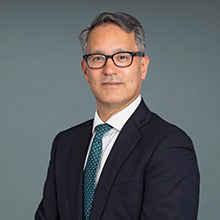Geriatricians are uniquely skilled in managing the complex illnesses, comorbidities, and related conditions that occur in older adults, as well as navigating care for common cognitive, functional, and psychosocial issues. Yet despite the increasing median age of the United States population, the workforce of physicians trained in geriatrics is expected to decrease over the next decade.
Recognizing this problem, the Department of Medicine at NYU Langone Health is launching an ambulatory consultative clinic to combat the growing shortage of geriatricians. Complementing the work of NYU Langone’s Pearl I. Barlow Center for Memory Evaluation and Treatment, the new clinic will focus on expanding access to geriatric services for those living in the community.
“At our new clinic, the aim is to address complex issues in an approachable, holistic manner.”
James M. Lai, MD
“Lengthy wait times and delays frustrate patients, their caregivers, and providers,” says James M. Lai, MD, associate director of clinical services for the Division of Geriatric Medicine and Palliative Care, and leader of the project. “In addition, a single inpatient admission is rarely sufficient to resolve every issue. At our new clinic, the aim is to approach complex issues in an approachable, holistic manner.”
Needs Going Unmet
Unmet care needs for older adults include frailty, falls, polypharmacy, cognitive disability, and memory loss. Owing to complexity and time constraints, primary care providers often have difficulty in managing these conditions, leaving patients without proper support.
“Reduced access to specialized geriatric care can lead to unwanted health outcomes and increased morbidity,” says Dr. Lai.
“Reduced access to specialized geriatric care can lead to unwanted health outcomes and increased morbidity.”
Accordingly, a key focus of the new clinic will be comprehensive geriatric assessment, which incorporates prognosis, quality of life, life expectancy, and each patient’s personal values into the decision-making process.
“By focusing on the patient’s goals and desires, we can better assess the benefits and risks of interventions, like medications or surgery,” Dr. Lai explains.
Moreover, Dr. Lai emphasizes that these assessments do not always lead to the initiation of a new prescription or surgical intervention, but may involve deprescribing or forgoing surgery to avoid postoperative complications.
For example, while a surgeon may deem some older patients good candidates for surgery, their cognitive or functional state may preclude them from achieving successful postoperative rehabilitation.
Better Outcomes Through Collaboration
Concerning access to care, Dr. Lai acknowledges that it remains a problem nationwide. He believes that providing specialized geriatric care in outpatient settings could help to expand access.
With the future in mind, Dr. Lai envisions the potential for pioneering and innovative collaborations with NYU Langone’s subspecialist divisions and Rusk Rehabilitation.
Through this synergy, he hopes to develop novel outpatient-based rehabilitation protocols for older adults who have cognitive impairment, imbalance, poor vision, urinary incontinence, and swallowing issues.
“Possible new partnerships might help to close the knowledge gaps in geriatric rehabilitation,” Dr. Lai says, “and may lead to improvements in healthcare provision for this high-risk population.”






